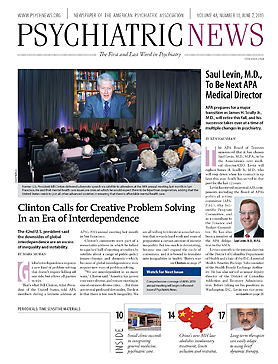Today’s patients can find almost anything on the Web, whether it is clothes or research on what car to lease. Generation Y and younger rely on the Internet as their main resource of information, spending less time at libraries and bookstores in favor of immediate gratification online. Many psychiatrists find themselves in a conundrum in deciding how to best embrace the digital age with regard to their practice. As Facebook expands from a popular Web site to a mobile phone platform, social media are not only here to stay, they are at the center of the user experience online. This article focuses on the ways that social media put their stamp on marketing your practice online.
It seems not too long ago that search engine optimization was the key to helping patients find your practice online. Creating multiple links to your site, embedding key search terms, and updating content were just some of the ways to increase the prominence of a Web site. While these strategies still apply, social media have added a new wrinkle to making a psychiatric practice Web site more visible.
The first article in the series discussed the social media sites Facebook, Twitter, and LinkedIn. This article will discuss Yelp, Doximity, and ZocDoc and concludes with a discussion of using social medial for professional purposes.
Yelp
People searching for a good Chinese restaurant can also now find your business on Yelp. This company started out with restaurant reviews, but quickly has branched out into reviewing all types of businesses. Members post reviews of the business, upload pictures, provide tips, and can even “check in,” which tells their Yelp friends where they have been. Yelp has been a tremendous way to find a good restaurant in an unfamiliar area by tapping into the knowledge base of its members. Since 2005, the site has implemented a “review filter” to suppress fake or malicious reviews. The site states that it protects both consumers and business users alike.
Recently, a psychiatrist colleague was contacted by Yelp to consider a business account. For a fee, Yelp offered to increase his visibility by moving his profile higher in searches for psychiatrists. Given the popularity of Yelp with its database of 36 million reviews, such advertising may be worth considering; however, the majority of psychiatrists have reviews in the single digits. The most number of reviews in the health care arena tend to be for dentists and optometrists in several large metropolitan cities. Additionally, even though it is at the discretion of the patient and therefore not a privacy violation, a “check in” to your practice on Yelp does not feel quite the same as a “check in” to your favorite restaurant.
Doximity
Doximity is led by Jeff Tangney, the cofounder and former president and chief operating officer of Epocrates. He created this company to help physicians connect with other health care professionals, grow their practices, and find business opportunities. There are now more than 100,000 U.S. physicians who are active Doximity users, and they have discussed over 10,000 cases in secure, physician-only forums. In addition, members can search for specialists to whom they can refer their patients, making on average 1,000 referral/expert searches a day. A major bonus is a free “e-fax” service that is HIPAA compliant with extra encryption. Documents can be uploaded via the browser and sent securely to a fax machine or the inbox of a Doximity colleague. When an e-fax arrives, Doximity notifies you via e-mail to log in and retrieve your fax.
One of the key features of Doximity is that members must use their real name and professional identities to be on the network. This policy helps maintain the professional focus and behavior on the site compared with other physician social networks that permit any account name and profile information. Doximity also authenticates the identity of each member as well, to ensure that each account belongs to the actual provider. It can also be installed as an app on the iPhone and Google Android-based smartphones, which includes all the communication features available online. Members can maintain an online CV similar to that on LinkedIn; however, Doximity provides the additional ability to find and import clinical trials from clinicaltrials.gov as well as publications from PubMed.
ZocDoc
ZocDoc is a free service that allows patients to find a nearby physician or dentist who accepts their insurance, see their availability in real time, and immediately book an appointment. It can be used on a computer as well as on the iPhone or Android smartphone. Patients review providers on a five-star rating system on bedside manner, wait time, and overall rating and can post comments. Only patients who actually have seen the provider via the ZocDoc appointment system can post reviews, which prevents fake or malicious reviews. In addition, reviews are also moderated to ensure they are factual and not profanity-laced rants.
This appointment service is available at no charge for setup. In addition, ZocDoc Check-In can collect information online from patients in advance of appointments. ZocDoc Answers is a service that answers patient questions from doctors at Cleveland Clinic, Massachusetts General Hospital, and NYU Langone Medical Center, to name a few institutions. Although this service is in beta testing, it may help psychiatrists get new patient referrals as it fosters patient trust in ZocDoc.
Discussion
There are numerous social media sites to help foster new patient referrals that were not reviewed here. Patient physician rating sites, such as Vitals.com, Healthgrades.com, and RateMDs.com also provide prospective patients with review information to consider before calling for an appointment. Angie’s List has also expanded from home-improvement services reviews into health care business reviews. I have highlighted only a few to consider and explore the implications of using such sites.
Many of the sites discussed above provide consumers with the opportunity to provide negative reviews, which may stain the online reputation of the provider. Unfortunately, the vast majority of these social-networking sites believe it is their duty to provide both negative and positive reviews to represent a true picture of a psychiatrist for the patient to consider. These sites typically will suppress any negative review that is all rant without any objective complaints. Similar to the lack of privacy online, we have to consider that we cannot control all of the information about our practice on the Internet.
I have counseled a number of psychiatrists and other specialty colleagues who have felt harmed by patients turning in negative reviews. Some physicians have encouraged other patients and providers to post positive comments on these sites to assuage the damage to their reputation. A few have even considered posting a rebuttal to the patient’s complaints or hiring a firm to fight for their online reputation.
I encourage these providers to take a step back and think about their main referral sources for their patients. The vast majority of them receive almost all of their referrals via their physician colleagues or current/former patients. For patients who find them online, they typically attempt to do some type of phone screening to improve the likelihood that the relationship is a good fit. I point out that another perspective to consider with negative reviews is that a patient who relies on negative reviews online more than personal recommendations may not be a patient they want in their practice anyway.
Social media are not only here to stay, but appear to be a constantly moving target in terms of understanding their impact on the doctor-patient relationship. There will always be yet another new Web site or “app” that proposes to revolutionize patient care, provider access, or communication. As professionals, we should not take the “head in the sand” approach with social media because they permeate every aspect of our lives. Instead, it is best to use these sites after some careful reflection on a variety of factors such as reputation, privacy, and benefit. ■

